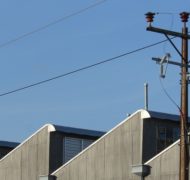On the Assembly Line
Blog / Produced by The High Calling
Sometimes I stumbled downstairs early enough to watch my father shaving at the bathroom sink, in his white t-shirt and navy slacks. While he buttoned the dusky-blue work shirt—sometimes fresh from the hot iron—my mother filled his thermos and locked it into the big lunch box. Be good, he waved to me. Down the sidewalk he would stride, his safety glasses in the front pocket, a pressed hankie in the back, catching his ride with the carpool.
He returned in the evening and dropped into a chair, sometimes with his head on his hands, sometimes full of union gossip or twinkling with work mischief.
When I asked what he did at work, he would tell me again: I am the foreman on an assembly line where we build car transmissions. A transmission makes the car go.
So you make engines? I would ask.
No. Transmissions.
Can I see it someday?
No. The plant is no place for children.
Tell me what the pin means again? I would point to the “30 and Out” button on his collar.
It means a man ought to be able to retire after 30 years of work, regardless of his age. Now go play! Or help your mother.
He would shuffle to the bedroom to change clothes, then he’d sit in the corner chair behind the newspaper, shrouded in cigarette smoke until dinner.
* * * * *
In the late winter, I throw off covers in the dark morning and grab a cashmere sweater, a pair of slacks. Often I startle to full-awake when I pull the car up to the 5-way intersection in the heart of downtown. Business-casual, check. Full make-up, check. Thermal coffee mug, check. A plate of scrambled eggs topped with a piece of toast sits on the passenger seat—a love offering from my husband.
I turn past the old mill, clip on my work ID, and keep moving. If I stop to think, surely I will turn into a pillar of salt. Fourth aisle to the right, second desk. Control-alt-delete, hang up the coat and I log in: 6:58 a.m. That means I can leave at 3:28 p.m., if I do not die of boredom.
While the database boots up, I admire the arched brick windows again, and the hand-hewn beams that hold up the next floor. Light washes into the old mill, a sunrise over the river that once powered a stocking-knitting mill. For a century, men and women have been glad for the work here. Carpet and quiet, cashmere and computer screen—we do not endure the same physical challenges at the publishing house. But it’s still an assembly line.
Once I begin work, I will make the same key-strokes again and again for four hours, as I correct the date formats of ten thousand magazines. Then, after a half-hour lunch break, I will make the same key-strikes for another four hours. Then I will go home, spent, and check in on the children’s homework when they, too, are tired and irritable.
I will make dinner, thinking about my father and his pin. He did not make the goal of 30 years. He loved the factory, loved the life of men and manufacturing, until a work-related back injury forced him to quit. I have never admired him more.





